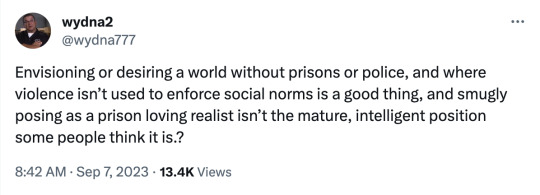#Epiphenomenalism
Explore tagged Tumblr posts
Text
Utilitarianism and Physicalism
Ever thought about how you know whether you could add utility? Can you actually compare how good two things actually are? The answer may depend on what exactly you think consciousness is. For a deeper discussion on the topic, read here. Criticism welcome!
#utilitarianism#Robert Nozick#Physicalism#peter singer#philosophy#blog#amature#mind body connection#Epiphenomenalism#morality#ethics
2 notes
·
View notes
Text
@pktechgirl @awellreadmannequin @aurora-phi
fucked up wizard spell: Reduce to Atoms.
You reduce your target into nothing but atoms. The atoms are still in the shape of a living, breathing human being, but the target no longer has an immortal soul.
3K notes
·
View notes
Text
i'm having lots of feelings about félix as mary from the black and white room... imagine him studying everything about what it's like to be free. reading stories, watching other people, yearning, yearning, yearning. he is separated from them, but even from here he can learn what it should feel like, learn the life he should be living, convince himself he knows. and still on that day where he slides the ring onto his finger... still on that day where he finally steps out into the world. still it all feels new, new and terrifying and beautiful, like he's never truly seen it before.
#autumn you're right epiphenomenal qualia needs to be a fic right now#felix fathom#felix graham de vanily
146 notes
·
View notes
Text

dream job right there
#this is from epiphenomenal qualia by Frank Jackson if anyone was curious#its a philosophy thought experiment not a description of real slug academia sadly
6 notes
·
View notes
Text

teenage exorcists: culture festival edition (continued from the brilliant original response to the post by @epiphenomenal - particularly the tags about a light disappointment natori’s class didn’t do a maid/butler cafe!)
can you believe this man will grow up to be paid for acting?! UR face shuuichi!
[id: teenage matoba seated at a cafe table at school festival, asking what’s on the menu. teenage natori in a butler outfit points to the exit sign]
#hexfest2k24#horrible exorcists#matoba seiji#natori shuuichi#natsume yuujinchou#fanart#a scribbled out joke i realized too late gets eaten posting it as reblog response#my pictures
71 notes
·
View notes
Text


A polynon is a conceptual geometric entity of which vertices are non-events and its edges holograms.
A polynon contains all the holograms of that which can be projected as a polytope, showing how consciousness can be fundamental.
In the Hexanon, shown above, the Observer O(n) is in superposition with the phenomenal p+, epiphenomenal p-, negative noumena n- and noumenal vertices n+ of the hexanon as a function for self-reflection of consciousness C.
The polynon is built on the lens mechanism of the wavefunction: each layer of the noumenal lens is a wavefunction in itself, providing mechanism for the observer as function of noumenal reflection.
The paper is now available on philpapers, as well: https://philarchive.org/rec/ROITPA
52 notes
·
View notes
Quote
A unitary web in process, self-initiating, in which I participate and whose aspect as it pertained to me my mind determined, conscious, all times simultaneous. I was not outside it. It was everywhere. Its self-motivation was to me most striking (e.g., "pretextual" cause; no laws were imposed on it). It was equally conscious and aware throughout. Every part of it was perfectly linked together into a structure (kosmos). Yet, the whole structure was epiphenomenal, a magician's trick, done for the sake of beauty, music and dance. It could "be" (appear) any way it wanted to anyone: different ways to different people. It took an infinity of forms, all of which came into being and passed away (ontogons) leaving only constants (phylogons) as parts of the structure — hence it was in flux like a self-perfecting organism. The complexity of the structure increased upward (i.e., toward the macro) and downward (toward the micro) with each passing second.
Philip K. Dick, The Exegesis of Philip K. Dick
#unity#multiplicity#self#world#image#body#micro#macro#reality#virtual#quotes#Philip K. Dick#The Exegesis of Philip K. Dick
12 notes
·
View notes
Note
10. Would you say that you’re an emotional person?
18. Do you believe in ghosts and/or aliens?
10: yes! so much so that it jeopardizes my well-being on a regular basis.
18: i don't believe that i live in a world with ghosts as metaphysical entities existing independently of the living—i.e. what is perhaps the popular definition of ghosts. but i think ghosts can be epiphenomenal, derivative of human experience. i believe in ghosts in that i believe people have the ability and tendency to witness past presences and project them back; i believe that a place can be haunted insofar as there are people to witness and simultaneously effect the haunting. thus i don't think ghosts are things that exist in places lying in wait for someone—people arrive in places and produce the ghosts as epiphenomena. without the living, what are the dead?
i think aliens are a statistical inevitability, though i would never venture to calculate an actual drake equation. i think the fermi paradox is unconvincing. i also think FTL is probably infeasible and stellar systems may constitute the limit on the possible range of a contiguous society.
[questions i think would be fun to be asked]
13 notes
·
View notes
Text
Science can either devise novel methods for rigorously examining mental phenomena or continue to rely primarily on the study of the physical correlates of the mind, while mental phenomena themselves display none of the normal physical characteristics of matter such as mass, velocity, impenetrability, and spatial extension and location.
It is a natural human tendency to regard only the phenomena we are attending to as real, and things we fail to notice as epiphenomenal or simply nonexistent ... Since science is based on quantitative, objective observation, mental phenomena, which are qualitative and subjective, have largely been overlooked or marginalized. Even when scientists have turned their attention to mental phenomena, they have largely done so by posing questions about their neural causes and behavioral effects. Hardly any progress has been made in observing such phenomena directly, in the only way possible: by means of first-person observation, or introspection.
B. Alan Wallace, Hidden Dimensions: The Unification of Physics and Consciousness
51 notes
·
View notes
Text
@bayesic-bitch:
Now, let's stop for a sec and ask -- why would Chalmers take a view that commits him to this weird a view of consciousness? Basically, this kind of unfalsifiability is not accidental on Chalmers' part. Like it would feel extremely natural to say that qualia could interact with the physical world and let that be that. But Chalmers really does not want to commit to a view that says "there's either magic or new physics happening inside the brain. Once brain scans get better we can test it and find out, and I trust that the brain scans will prove me right". He very clearly does not think we'll find anything like that, and so he's constructed his argument against reductive materialism so that it can never be empirically falsified. The fact that you can't test it empirically is a carefully designed feature of this framing, not a bug or an incidental detail. That's what he's talking about when he calls his position a "benign form of dualism" -- it doesn't commit you to contradicting physics, because it can never produce testable predictions. It's the whole reason you would choose this framing over something like Des Cartes'.
(made a new thread bc the old one was getting very long)
this is not why Chalmers elects for non-interactionist views. rather, he believes that a causally efficacious theory of consciousness would just kick the can down the road, because he can always imagine a version of consciousness that only has the causal properties of consciousness, and not the phenomenal properties. i think The Conscious Mind is pretty clear about this, but may not be framing it in exactly the right way. i can find the quotes i am thinking of that make this clear later.
edit: actually Chalmers does say he doesn't want to bet against the physically closed universe, so you were right, but i was right as he says the main problem is that interactionism doesn't solve anything:
In any case, all versions of interactionist dualism have a conceptual problem that suggests that they are less successful in avoiding epiphenomenalism than they might seem; or at least that they are no better off than the view I have advocated. Even on these views, there is a sense in which the phenomenal is irrelevant. We can always subtract the phenomenal component from any explanatory account, yielding a purely causal component. Imagine (with Eccles) that "psychons" in the nonphysical mind push around physical processes in the brain, and that psychons are the seat of experience. We can tell a story about the causal relations between psychons and physical pro- cesses, and a story about the causal dynamics among psychons, without ever invoking the fact that psychons have phenomenal properties. Just as with physical processes, we can imagine subtracting the phenomenal properties of psychons, yielding a situation in which the causal dynamics are isomorphic. It follows that the fact that psychons are the seat of experience plays no essential role in a causal explanation, and that even in this picture experience is explanatorily irrelevant.
40 notes
·
View notes
Text

Epiphenomenal syntax
9 notes
·
View notes
Text
i'm curious what proportion of the tumblr userbase believes that there are mental properties that are not fundamentally emergent from physical ones. not curious enough to do a poll on it but, like, i think that mental states are not causative, and while they have some predictive power (if someone eats a bite of an apple and is disgusted, they will likely not eat a second bite) the actual causative agent is whatever motion of atoms and particles in their brain, in the same way that you can somewhat predict where a billiard ball will move by looking at its shadow's motion but the shadow is not causative. i think this is called epiphenomenalism?
i also don't find the idea of a p-zombie coherent for broadly similar reasons: consciousness is an emergent property of matter interacting in such-and-such a way, and so you can't have matter arranged the same way as me but without consciousness in the same way that you can't have matter arranged the same way as the air in this room and have it not be about 290 kelvin.
14 notes
·
View notes
Text
I always thought 'denatured alchohol' was like denatured proteins, chemically modified to be ineffective. But no, anything added to alcohol to make it unpleasant or unsafe to consume for the purpose of drunkenness is 'denatured alcohol'.
Thus we may conclude that the essential nature of alcohol is getting you drunk, and everything else is epiphenomenal.
3 notes
·
View notes
Note
Thoughts on Kantbot? Do you think his shift in views and people he associates with is a cynical move or an organic development? (i. e. he met his wife and his social circle changed so he gained new perspective or just had to appeal other people)
I haven't kept up with him in years. A viscerally unpleasant character, smug and nasty. I just checked—he hasn't changed. If I understand the shift in his views correctly, and I'm not sure I do, he's provided a different set of answers, now materialist and information-based where once they were idealist and affect-based, to the same set of questions about how modern power and consciousness operates. He was telling people to read Lukács and Habermas when I stopped reading him; this, too, is completing the system of German Idealism, very explicitly in Lukács's case:
In Section II of this essay we discussed Kant’s view of the ontological proof of God’s existence, of the problem of existence and thought, and we quoted his very logical argument to the effect that if existence were a true predicate, then “I could not say that precisely the object of my concept exists.” Kant was being very consistent when he denied this. At the same time it is clear that from the standpoint of the proletariat the empirically given reality of the objects does dissolve into processes and tendencies; this process is no single, unrepeatable tearing of the veil that masks the process but the unbroken alternation of ossification, contradiction and movement; and thus the proletariat represents the true reality, namely the tendencies of history awakening into consciousness. We must therefore conclude that Kant’s seemingly paradoxical statement is a precise description of what actually follows from every functionally correct action of the proletariat.
But I don't know nearly as much about any of that as he does, and I never could read Kant, even though, from my first semester of college straight through my orals in grad school, they kept making me read Kant. "Who cares?" he always demands, now seeing culture, I gather, as epiphenomenal to esoteric economic manipulation. He seems like a true academic in his soul: a genius-level ability to synthesize extraordinary quantities of information coupled with endless reserves of pettiness and spite rendering this intelligence irrelevant. If you demand of someone who hasn't even addressed you, "Who cares?," then you're the one who cares, perhaps inordinately. I doubt his change of views is cynically motivated, though. You really can work your way honestly through your intellectual concerns and only realize later what your mental traversal implies of a practical political shift. Also, those guys are always darkly hinting at what they saw behind the scenes of the far right, the involvement of big money and intelligence agencies, I assume, and, since you have me re-investigating, he just re-X'd this, for example—

—and has endorsed the lib-media-is-promoting-BAP theory, which I have also come to believe (twice now they've done an "exposé" on him just before he releases a book)—

—and, as I have never succeeded in attracting the support of big money and intelligence agencies myself, I will take their word for it. I'll leave you with a sincerepost in conclusion:

I'm sure he believes this; I do too, but how we get from here to there is unfathomably complicated given the world we have co-created around us, and I don't pretend to know all the determinants that have landed us in this dilemma nor all the determinants it would require to get us out.
2 notes
·
View notes
Text
"This sense of history’s inevitable progression into modernity as the final phase of some ill-defined maturation process is not believed any longer by most modern secular intellectuals. Most of them have long since moved on from such high-minded and hortatory Enlightenment moralizing which is viewed by most now as still far too classical in its understanding of existence. They have moved instead into a cynical and merely stipulative Liberalism having no grounding in anything except our functional desire to create the social conditions necessary in order to maximize the digital transformation of our world into a techno-paradise of manufactured reality tailored to the whims of the untethered self. There is a nihilistic weariness with reason and metaphysical thought as such viewed now as just so-many epiphenomenal brain ejaculations having no purchase on reality."
— Dr. Larry Chapp: “Orwellian Synodality”
6 notes
·
View notes
Note
Are you a mind-body dualist?
no. i dont have a strong opinion on the mind-body question bc it's not something ive researched and im skeptical that we're at a point we can know much about it or say anything with much certainty.
that said, hard dualism has too many problems (brain injuries) for it to be satisfying to me. but at the same time, i think any hard physicalist approach (like epiphenomenalism or eliminative materialism) is unsatisfying bc our experience of abstract concepts does not seem to work with it.
HOWEVER, property dualism (there isnt a separate nonphysical thing called the mind, but our thought exhibits nonphysical qualities sometimes) seems plausible. this isnt a view im inclined to adopt for other reasons tho.
another plausible view imo is the aristotelian-thomistic corruptionist soul-body account, where the soul is not a separate substance. a soul is just the "principle of life" in a living thing--everything that is alive--animals, plants--has a soul. a soul is a "form" or structure. you could think of it as a code, which is a rough analogy but works. a human soul has some nonphysical properties bc it can apprehend universals. but bc it's not a separate substance it isnt you, you are your body and your soul bc they're not separate things. your soul can survive death bc it has these nonmaterial capacities, but without your body it can't really function because sense impression is necessary even for abstract reasoning (i.e. logical symbolism). so if your soul/"mind" continues to exist after your body is destroyed it's kinda like if you were transformed into digital data and stored on a usb stick. your form (soul) would still technically exist, but without matter (your body) it can't do anything because it isn't you and is meant to function with a body. this is kind of weird and messy (soul and body aren't different parts of you but rather codependent principles of your existence as a substance) but it does seem to work well phenomenologically.
sometimes i also think that panpsychism (the idea that consciousness is an attribute of all matter and humans just have it arranged in a way that is particularly appropriate for abstraction and language) is. more plausible than a lot of other theories. but it doesnt have much explanatory power for why humans have these unique qualities and other things and other animals dont demonstrate consciousness in more similar ways.
but then i read kant or plato and im like maybe we should all be transcendental or platonic idealis-*a comically large hook yanks me off the stage and gunshot noises are heard*
#short answer: i dont know and i dont think anyone does! but these are the views with the least problems imho#philosophy posting#btw feel free to say if u think any of this is stupid or sucks philosophers love it when ppl disagree with them
2 notes
·
View notes